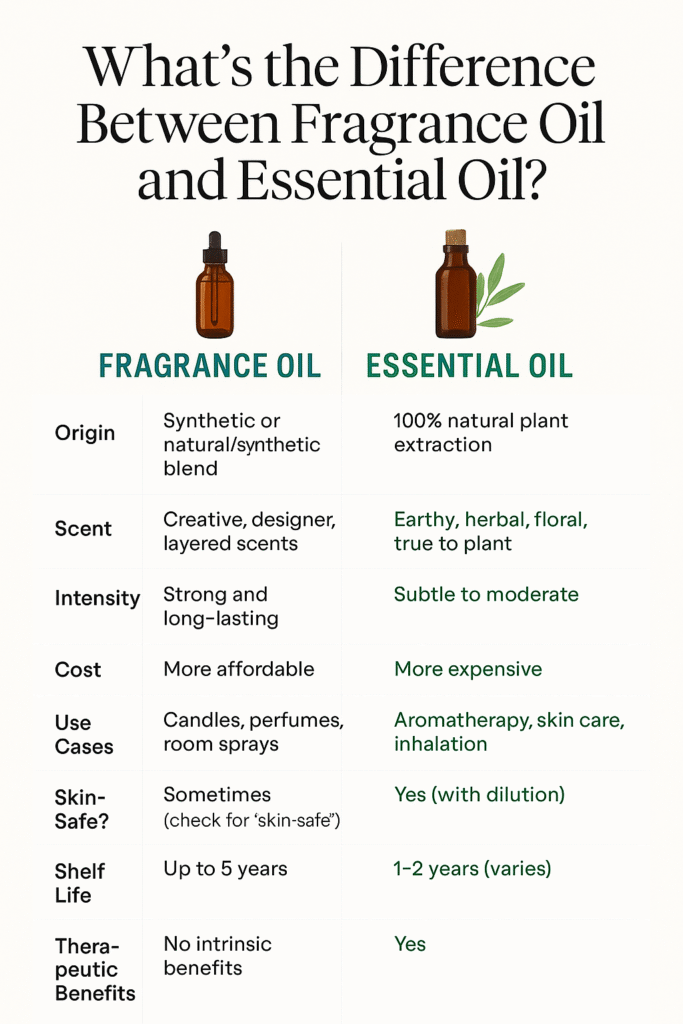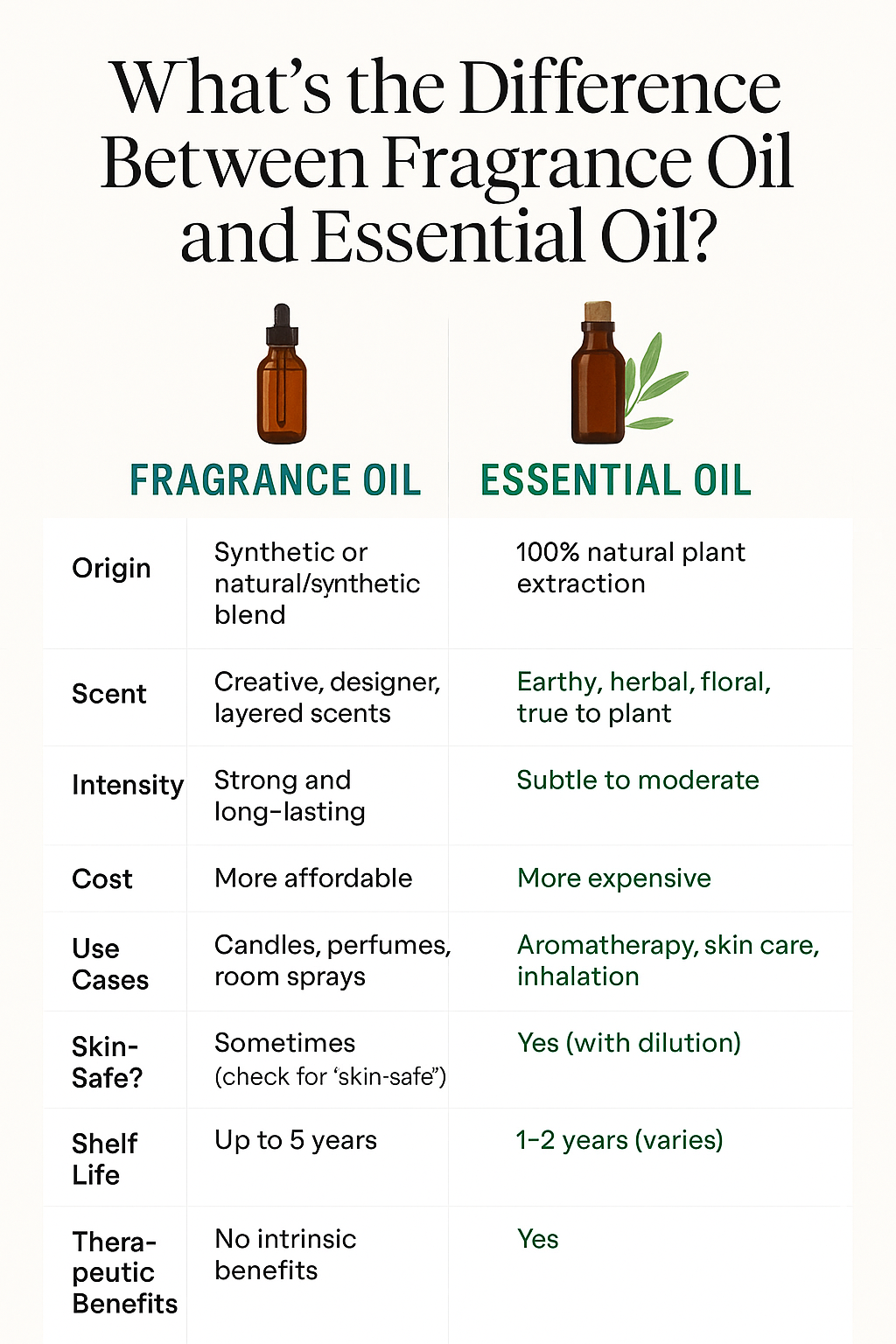What’s the Difference Between Fragrance Oil and Essential Oil?
🌿 What’s the Difference Between Fragrance Oil and Essential Oil?
🧭 Introduction: Similar Names, Different Natures
If you’ve ever browsed candles, diffusers, or skincare labels, you’ve probably seen both “fragrance oil” and “essential oil.” While they may seem similar—both are aromatic oils—they’re very different in terms of origin, composition, usage, and safety.
In this guide, we’ll break down everything you need to know to choose the right oil for your personal, DIY, or commercial needs.
🌱 What Is an Essential Oil?
Essential oils are pure, natural extracts obtained from flowers, leaves, bark, roots, or peels of plants through distillation or cold-pressing. They capture the “essence” or aroma of the plant and often contain therapeutic compounds.
🌿 Common Essential Oils:
- Lavender oil – relaxing, skin-soothing
- Peppermint oil – cooling, refreshing, energizing
- Eucalyptus oil – cleansing, respiratory support
- Lemon oil – uplifting, antimicrobial
They’re widely used in aromatherapy, massage, natural skincare, and holistic wellness.
🧪 What Is a Fragrance Oil?
Fragrance oils are synthetic or blended oils made from a mix of natural extracts and laboratory-created aroma compounds. They are designed to mimic specific scents or create unique ones not found in nature—like “Fresh Linen,” “Bubblegum,” or “Ocean Breeze.”
🔬 Characteristics of Fragrance Oils:
- Made for long-lasting, stable scent performance
- More versatile in crafting candles, soaps, perfumes
- Can replicate complex multi-note profiles (top/mid/base)
Fragrance oils shine in commercial perfumery and DIY scented products because they’re cheaper, stronger, and more consistent.
⚖️ Fragrance Oil vs. Essential Oil: Key Differences
| Feature | Essential Oil | Fragrance Oil |
|---|---|---|
| Origin | 100% natural plant extraction | Synthetic or natural/synthetic blend |
| Scent | Earthy, herbal, floral, true to plant | Creative, designer, layered scents |
| Intensity | Subtle to moderate | Strong and long-lasting |
| Cost | More expensive | More affordable |
| Use Cases | Aromatherapy, skin care, inhalation | Candles, perfumes, room sprays |
| Skin-safe? | Yes (with dilution) | Sometimes (check for “skin-safe”) |
| Shelf Life | 1–2 years (varies) | Up to 5 years |
| Therapeutic Benefits | Yes | No intrinsic benefits |
🎯 When Should You Use Each One?
✅ Use Essential Oils When:
- You want natural, unadulterated ingredients
- You’re doing aromatherapy, massage, or skincare
- You’re seeking emotional or physical health support
- You have sensitive skin or want clean label products
✅ Use Fragrance Oils When:
- You’re making candles, wax melts, or home sprays
- You want a scent that lasts longer and projects better
- You need a specific scent profile not available naturally
- You’re on a budget-conscious project
⚠️ Are Fragrance Oils Safe?
While synthetic, most commercial fragrance oils are safe when manufactured to IFRA (International Fragrance Association) standards. However:
- They’re not always skin-safe, unless labeled specifically
- Not suitable for diffusers or direct inhalation
- May contain phthalates or allergens, depending on the brand
By contrast, essential oils are natural, but can still cause skin irritation or allergic reactions if undiluted.
🔍 Tip: Always check for certifications like “skin-safe,” “phthalate-free,” or “IFRA-compliant.”
🏷️ How to Tell Them Apart on Labels
Because marketing can be vague, here are clues to help you identify what you’re buying:
- Essential Oil → Look for terms like 100% pure, steam distilled, botanical name (e.g., Citrus limon for lemon)
- Fragrance Oil → Look for terms like fragrance, parfum, perfume oil, aroma oil, or type oil
🧴 Can You Mix Them?
Yes! Many artisans and formulators blend essential oils and fragrance oils to get the therapeutic effects of the former and the lasting scent of the latter.
Example: A candle might contain lavender essential oil blended with a lavender vanilla fragrance oil to enhance both wellness and aroma strength.
✅ Final Thoughts: Purpose Defines Preference
Neither essential oil nor fragrance oil is inherently better—they serve different purposes:
- Essential oils are ideal for those seeking purity, plant-based wellness, and minimalism.
- Fragrance oils excel in scent creativity, consistency, and affordability.
👉 Choose based on your goal—healing, scent, budget, or aesthetics. When in doubt, start with sample sizes and always read labels carefully.

